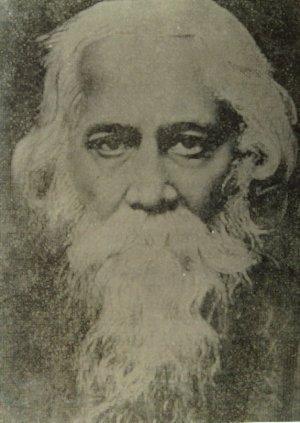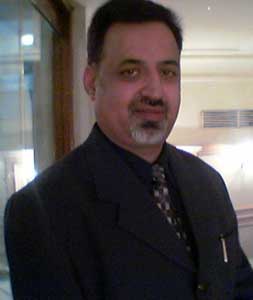 |
 |
|
|
 |
||||||
| Rabindranath
Tagore, pronounced Ravindronath Thakhur, was born May 7, 1861 or the 25th
day of the month of Baisakhi in the year 1268 (Bengali lunar calendar)
in Calcutta, amidst turmoil of British and Indian relations. He was the
sixth child born to Sarada devi and Mahashri Debendranath Tagore.
Tagore was nursed in the political ideals bequeathed to him by his father, the honorary Secretary of the British Indian Association. The awakening of the Indian mind received a shock from the racial arrogance of the ruling British class. Tagore was admitted to the Oriental Seminary in 1868. He found the lessons at school uninteresting and hated the idea of punishment for making mistakes. Tagore was transferred to the Normal School and thereafter to St. Xavier's. Tagore sailed for England on September 20, 1878 and was admitted to the London University. Tagore, unlike most of the other freedom fighters of his time, exposed the depravity of the British rule by chronicling all his adversities with British imperialism through poetry and literary works. He wrote most of his pieces in his mother tongue, Bengali, to be later translated to cater to his vast audience. He used his literature as a mobilization for political and social reform, hence allowing other nations to be aware and further apply international pressure to Britain to be accountable for its actions. He documented everything that would expose Britain's true intentions in India. He was always a poet foremost, but due to the situation he was born into, his role in India's independence movement was to inspire faith in the dream that was unfulfilled. Without faith there was no future to be created. Tagore said, "It is the dreamer who builds up civilization; it is he who can realize the spiritual unity reigning supreme over all differences of race." Instilling national pride, he believed that India must earn her freedom. He was insistent that the Englishman in India was an external fact and that the country was the most true and complete fact: "Try to build up your country by your own strength because realization becomes complete through creation." Hence, Tagore advocated that we can only realize our own self in the country if we seek to create the country we wish to live in by our thought, our activity and our service. The homeland is the creation of the mind and that is why the soul realizes itself (finds itself) in its own experience in the motherland. Tagore asked his people, in "Swadeshi Samaj", to win back the country, not from the British, but from apathy and indifference. He believed the country would attain a form of salvation only when all of its parts pulsated with passion for the recovery of the motherland. Hence, Tagore's method for liberation was an internal, intellectual movement: "Unreasoning faith, blind habits of mind, adherence to customs that had no merit save their age, the repression of intellect and heart in the unproductive channel of inaction - all of this is the antithesis of the forces that reveal people in all their full glory and dignity. This is the root cause of degeneration." His goal was not economic restructuring, but emotional liberation from the British, leading to economic and political reform. Tagore was not a supporter of the non-cooperation movement as he felt the end result of disassociation from the British would be futile, since the future would only lead back to assimilation. Mahatma Gandhi and Rabindranath Tagore differed in this way in their thinking on how to free India. Tagore and Gandhi, however, had a fond affinity for one another. Gandhi termed Tagore as his "Gurudev". Jawaharlal Nehru stated, "No two persons could possibly differ so much as Gandhi and Tagore." Yet this is a perfect example of the Hindu philosophy of acceptance in the pursuit of knowledge and the richness of India's age-long cultural genius. Gandhi consulted Tagore regarding methods of liberating India, stating that knowing his best friend was spiritually with him sustained him in the midst of the storms he entered. Tagore began to resurrect his people by the introduction of schools. He taught subjects promoting that man can extend his own horizon and achieve a second birth through creativity and art. He opened his first school in Santiniketan. He began the regeneration by directing his efforts primarily at education with the foremost hope of promoting literacy and then health via enforcement of social conduct. Tagore was born into the priestly class, placing him in the highest class in Indian culture. However, he believed that India, by creating smaller and smaller spheres was destroying the vitality of her people. He refused to reap any benefit from the caste system and lived among the poorest of people. He recognized that when the British government created separate electorates for the castes among Hindus, its intention was to separate the Hindu community. Gandhi and Tagore, both of the same mind, protested to this differentiation, leading to Gandhi announcing a fast until death on September 0, 1932, which did not end in tragedy. This consciousness of the abject condition and miserable helplessness of the poor, unlucky people was the basis of his political philosophy in the years that followed. Rabindranath Tagore was probably most famously known as the author of India's national anthem, J"ana Gana Mana." The national anthem was first sung on December 27, 1911 at the Indian National Congress in Calcutta in glory of the motherland. It is also a song of reverence to the Lord of the Universe, the Dispenser of Human Destiny, Arjuna, who drives India's history through the ages along the rugged road with the rise and fall of nations |
||||||
| Jana
Gana Mana
Thou are the ruler of the minds of all people Thou dispenser of India's destiny Thy name rouses the hearts of the Punjab, Sind, Gujarat and Maratha, of Dravida, Orissa and Bengal It echoes in the hills of the Vindhyas and Himalayas, mingles in the music of the Jamuna and Ganges, and is chanted by the waves of the Indian Sea, They pray for thy blessing and sing thy praise, Thou dispenser of India's destiny, Victory, Victory, victory to thee. Day
and night, thy voice goes out from land to land, calling Hindus, Buddhists,
Sikhs and Jains round thy throne and Parsees, Muslims and Christians.
Eternal
charioteer, thou drivest man's history along the road rugged with rises
and falls of Nations.
When
the long dreary night was dense with gloom and the country lay still in
a stupor, thy Mother's arms held her, thy wakeful eyes bent upon her face,
till she was rescued from the dark evil dreams that oppressed her spirit.
Though
night dawns, the sun rises in the East, the birds sing, the morning breeze
brings a stir of new life.
|
||||||
| As Tagore
became recognized as a prolific poet, through the translation to English
of his most famous work Gitanjali, he acquired international fame with
an introduction by W.B. Yeats. He was selected for the Nobel Prize in literature
the next year and was granted a Nobel laureate subsequently in 1914. Furthermore,
the University of Calcutta gave him an honorary Doctorate of Literature.
The British government conferred upon him a knighthood celebrating the
occasion of the King Emperor. However, in 1916, the poet renounced this
knightship in protest to the Jallianwala Bagh massacre of 1919 where 379
people were killed as the Imperial Government obtained the right to jail
without trial, anyone whom they regarded as fractious. He wrote a stinging
letter abandoning all amity and worked to strengthen India on a grassroots
level.
In the years that followed before and after the Independence of India, Tagore became a spiritual ambassador, visiting Japan, Central and North America and other nations promoting understanding of culture and the follies of aggressive nationalism. He grew as a writer of poems. In his career, from 1878 to 1931, he wrote: songs, plays, novels, short stories, literary criticisms, lectures on religion and philosophy, and dramas. Then, from 1928 to 1940, he produced two thousand paintings. In later years, as Tagore reached his sixties, he tried to finance his Vishva-Bharati University personally. He relied on royalties and proceeds from his lecture tours. By 1941, Tagore's health had seriously deteriorated. When India attained independence, its first Prime Minister, Jawaharlal Nehru, who was a great admirer of Tagore, had an act passed to adopt Vishva-Bharati as one of the Central Universities. Tagore died peacefully, after an operation in Calcutta on August 7, 1941. Calcutta residents came by the thousands to have a last look at their beloved poet, as his body was carried to the bank of the Hoogly River for cremation. He was the quintessence of Indian culture and the living voice of India. Convincingly, he was the Prophet of Peace
|
||||||

Welcome to Rajesh Chopra's Guest Book and comments Please |
| Back to Home |
 |
 |
 |
 |